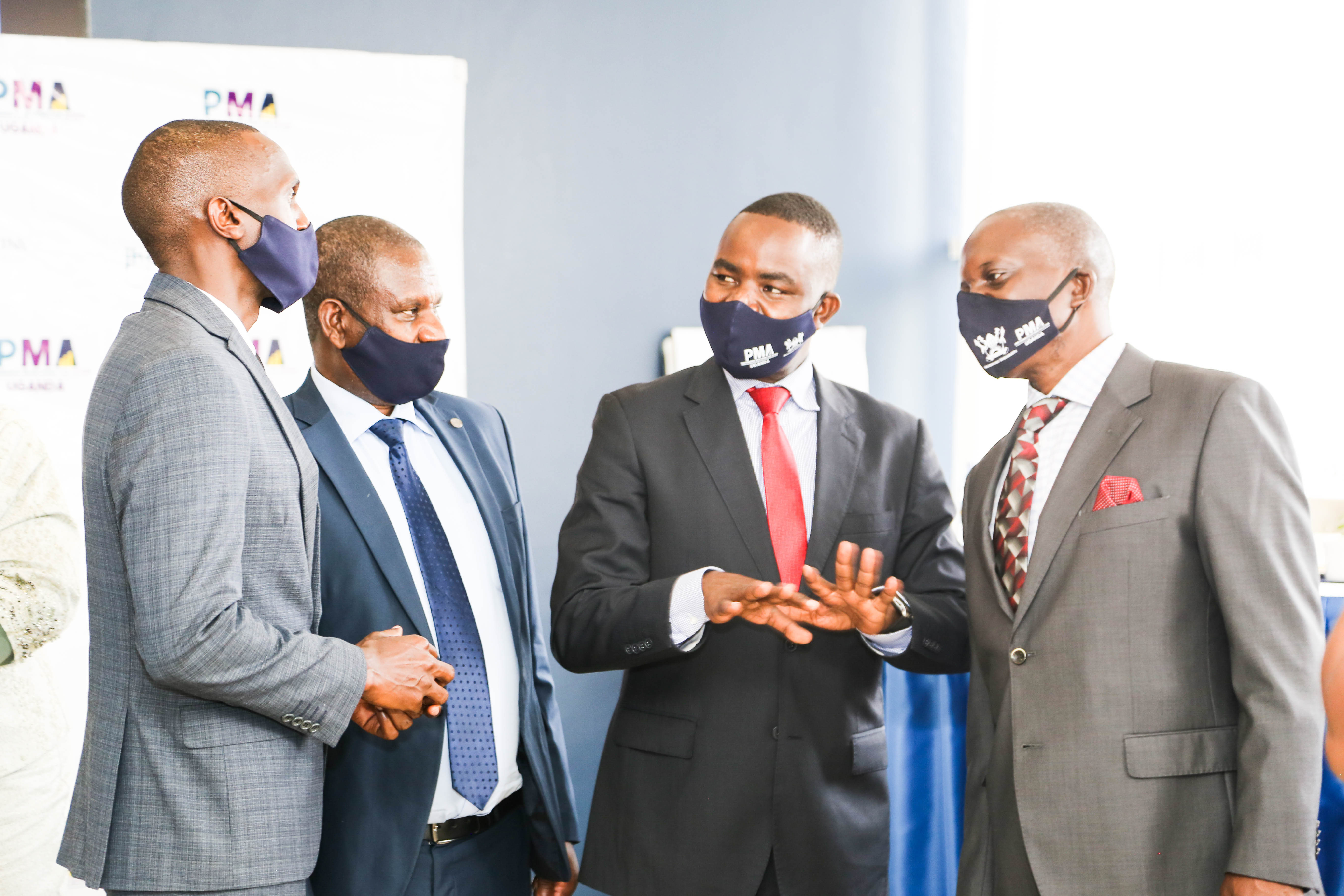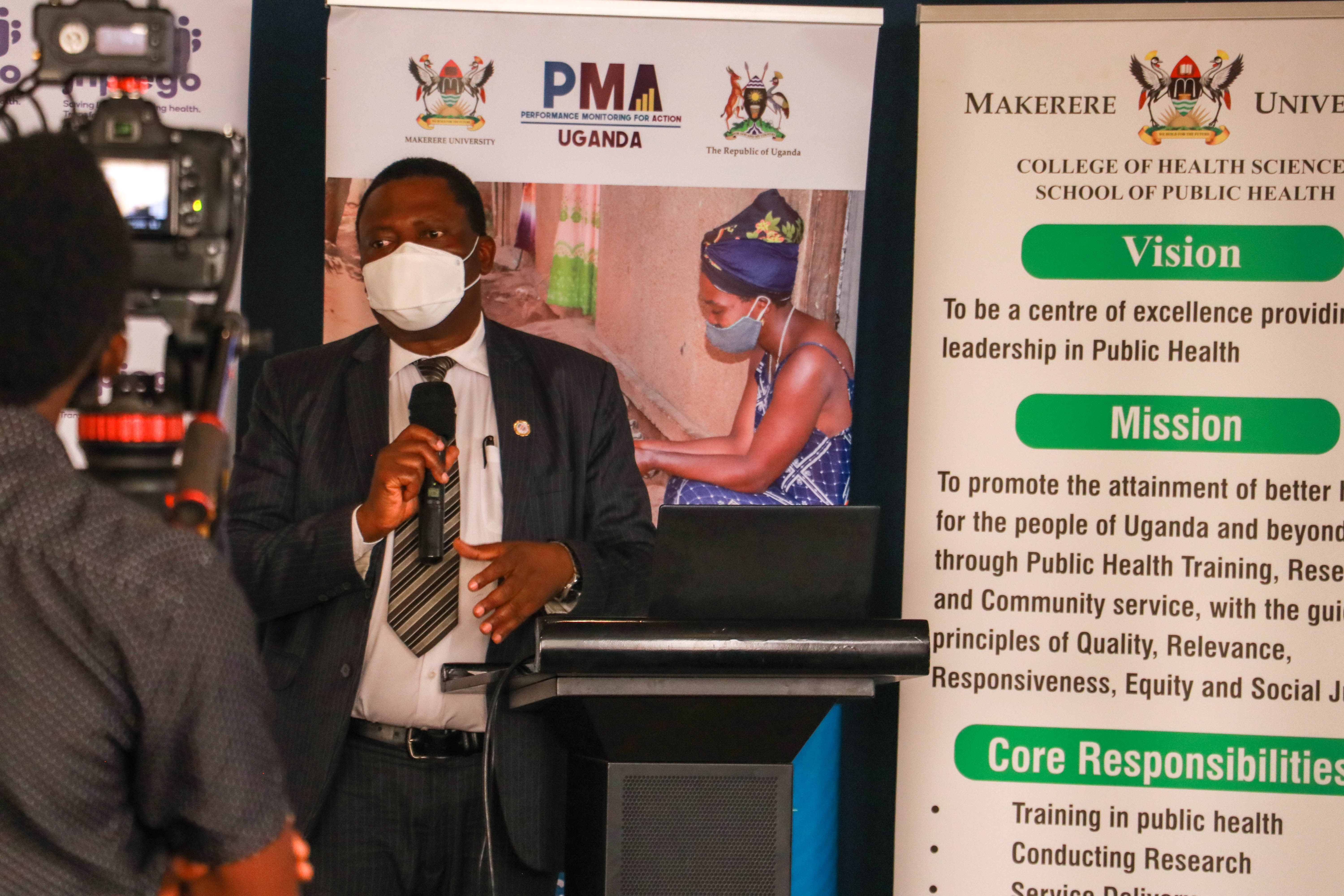
Kampala, Uganda, Feb. 16, 2022 (MakSPH) – Commissioners at Ministry of Health in Uganda have applauded the Performance Monitory for Action -PMA Uganda project for its robust research in family planning.
Dr. Olaro Charles, the Director Health Services- Curative Services at the Ministry of Health says the Ministry is grateful for the work that PMA does, citing that it would cost government a lot of money since such work would require a consultant to do it.
“The data collected in this PMA survey inform monitoring and assessment, assessing the progress of the targets as we set in the Family Planning 2030 commitments and the costed implementation plan. I am happy that all of you were involved during the formulation and official launch of these commitments,” Dr. Olaro said at a recent dissemination of panel survey results for phase 2 at Golden Tulip Hotel in Kampala.

PMA Uganda, a Bill and Melinda Gates Foundation funded project at Makerere University School of Public Health (MakSPH), a leading public health institution in Uganda and within the East and Central Africa region uses innovative mobile technology to support low-cost, rapid-turnaround surveys monitoring key health and development indicators.
Between September and November last year, MakSPH-PMA project led by Principal Investigator Dr. Fredrick Makumbi and Co-Principal Investigator Dr. Simon Peter Kibira conducted a survey from 4,399 households where 4,346 females of ages 15-49 were interviewed. Also, data was collected in 384 health facilities and 2,370 client-exit interviews conducted.
According to the results, the trends in use of Contraception among all women of age 15-49 increased from 35% in 2020 to 40% in 2021 in all methods. On further analysis, those using modern methods of contraception increased from 29.5% to 34% while those using traditional methods of birth control rose slightly from 5.5% in 2021 to 5.9%.
“I am also happy to mention that I sit in the FP20 global committee, and as you know this is great not only for our country but as well as the region. From the first PMA survey, we were seeing the country making progress, however slow it is towards increasing modern contraceptive usage. As you all know the FP2030 objectives were launched and we need to be able to work. I will soon share with you the considerable plan, which is also a precursor for us to be able to achieve our Family Planning 2020,” said Dr. Olaro.
The Government of Uganda set an ambitious goal to increase the modern contraceptive prevalence rate to 50% by 2020. This however was not achieved. In acknowledging this, Dr. Olaro notes that there are still unsolved challenges with the quality of family planning services especially the counselling of users.
“If you go to back to our commitments, one of them is purposed to address this challenge. To address family planning misconceptions, government committed to improve counselling and in it, we provide what options are available, possible side effects and how we manage them, and how the users pick on a different component. So, with implementation and measurements, we shall be able to overcome the challenge,” says Dr. Olaro.
Hons. Catherine Namuddu, Sylivia Bahireira, Joel Ssebikaali, Charles Ayume, Hope Nakazibwe, Ronald Bagaga and Bayiga Rulume, all Members of the Health Committee of Parliament attended the dissemination.
Professor of Disease Control, Researcher, Public Health Expert and Dean, MakSPH, Dr. Rhoda Wanyenze says a lot of the work that done at MakSPH is geared towards ensuring equity and through evidence. According to Prof. Wanyenze, PMA program is one of the projects at MakSPH where researchers generate evidence and continue facilitating policy formulation.
“This program shows this because on the data we have generated, has to be used by all these stake holders here with us today. For example, we have just used the PMA data to inform Uganda’s FP2030 commitments and before that we were also looking at this data while implementing the costed development plan,” she said.

Speaking to an audience that had legislators under the umbrella of the Health Committee of Parliament, Professor Wanyenze said improving health requires holistic approach that includes several other sectors of development including education. She also appealed to the legislators and the sector planners to re-orient health by investing more in promotion of health and prevention of disease than focus only at treating people.
“We can also generate more evidence. You can tell us where it is that you need more evidence that you do not have so that we can work together to generate evidence. We are available and ready to work with you so you can make more evidence-based interventions,” she said.
In light of the Makerere University centenary celebrations, Dean Rhoda pledged continued generation of evidence that adds value.
Dr. Olaro paid emphasis on need for concerted efforts of Ministry of Health an its partners required to solve family planning challenges.
“We need to develop and adopt the use of innovative strategies to inform programming in an effort to address some, if not most of these challenges and I want to implore you to implement what works based on the findings,” Dr. Olaro said.
Further adding that; “These statistics that guide in programming should be progressively pursued and we are looking forward to continue good working relationships as we strive for better health of our communities in which we serve and live.”
Dr. Richard Mugahi Adyeeri, the Assistant Commissioner in charge of Reproductive and Infant Health said MoH appreciates Dean Rhoda’s comments especially the call for evidenced based Interventions and the ability of the ivory tower, to keep producing this evidence whenever it is needed.
“We also appreciate your comment about the partnership with education, given the fact that the determinants of health, some of them fall in education, others are housed in agriculture, and we need a total rethink of our post pandemic public health interventions,” Dr. Mugahi observes.

The Head of surveys at Uganda Bureau of Statistics (UBOS) Mr James Muwonge, while representing the Executive Director Dr. Chris Ndatira Mukiza congratulated MakSPH for pulling off this national survey and for having consistent data.
He encouraged research entities to continuously share information and best practices, as well as coordinate research efforts across different agencies. He also committed on behalf of UBOS to continue working together with MakSPH.
“The Dean has talked about the need to utilise information. There is a lot of information that is collected, but probably not much is being used but looking at the audience in here, I am encouraged and feel contented that the information is getting as far as the parliament because it influences policy and the fact that within the audience we have the policy makers, to me it is a testimony and really important,” said Muwonge.

National Population Council (NPC) Director General, Dr. Jotham Musinguzi said they advised Parliament on the need to invest in the population, reduce fertility in this country, and investments in education as a means to reduction of fertility.
NPC was established by the National Population Council, Act 485, 1994, to advise Government on all population matters. Dr. Musinguzi observes that if we do not reduce fertility fast enough, we will not be able to benefit from the demographic dividend.
“We have an opportunity now that Fredrick (Makumbi) and Simon (Kibira) have shown us that we can impact on contraceptive work, we can push it firmly, we need to make sure that education, health are working together so that the population moves from a pyramid that is very heavy at the bottom, to a pyramid that has a lot of people in the middle and these people get education, health and have skills,” he said.

In the last decade, Dr. Musinguzi says Uganda has been reducing on mortality and fertility rates citing that that's when the country enters the realm of opportunity.
“I want say that this is something very important and we need to continue leaning to reproductive health and family planning especially use of contraceptives and through working with the Ministry of Health and other development partners. That is the only way we are going to achieve big impact on health, education of the population,” he said.

Dr Betty Kyadondo, the head of Family Health Department at NPC noted that while there was an increase in the uptake of family planning services and that modern contraceptives, the country still needed to do more.
She says great attention to the issues of use of contraceptive by certain groups such as adolescents and men, that are largely under looked and misrepresented is important.
“They don’t get adequate counselling in times they need the service but we are seeing an increasing number of teenage pregnancy rates and if we don’t work with these young people, its risky and sensitive issue and many people are shy to talk about it but its high time we faced it and addressed sexually active adolescents about the use of family planning methods,” Dr. Kyadondo says.
She advances the need to leverage on the existing efforts in improving family planning service delivery such as human capital development program, community mobilisation and mindset change to reduce negativity and misconceptions about family planning, utilization of the parish development model through its pillars as well as integration of integrate technology into our family planning agenda.
By Davidson Ndyabahika

